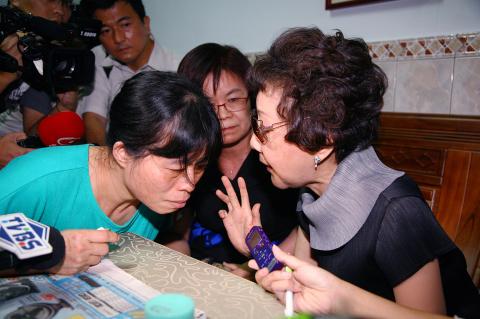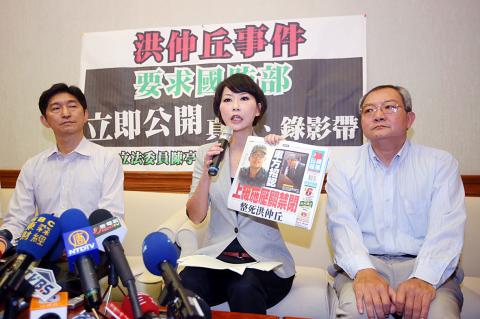|
Vice commander
detained over Hung
‘SERIOUS LOOPHOLE, DEFECT’: Colonel Ho Chiang-chung
faces charges of offenses to personal liberty, coercion and punishing personnel
beyond regulations
By Rich Chang and Chris Wang / Staff reporters

Shaw Hsiao-ling, right, wife of
Greater Taichung Mayor Jason Hu, yesterday visits the home of corporal Hung
Chung-chiu, who died of heatstroke on July 4, to offer condolences to Hung’s
mother, left.
Photo: CNA

Chief military prosecutor Tsao
Chin-sheng, right, listens at a press conference in Taipei yesterday as
Democratic Progressive Party Legislator Chen Ting-fei, center, calls for video
evidence concerning the July 4 death of army corporal Hung Chung-chiu to be made
public.
Photo: CNA
The vice commander of the army’s 542nd
Brigade, Colonel Ho Chiang-chung (何江忠), was yesterday detained over his alleged
role in the July 4 death of army corporal Hung Chung-chiu (洪仲丘).
The Ministry of National Defense said the Military High Court at 10:40am granted
military prosecutors’ request to detain Ho. Ho is the first senior military
official to be detained over Hung’s death.
The ministry said Ho was suspected of using his position of authority to force
other brigade officers to have Hung punished with confinement a few days before
he was set to be discharged from the military.
Ho is alleged to have committed offenses to personal liberty by a public
authority, the offense of coercion by a public authority — both included in the
Criminal Code — and the offense of punishing military personnel with categories
of punishment not included in the regulations of the Armed Forces Criminal Act
(陸海空軍刑法).
The ministry said military prosecutors believe Ho may collude with others and
might destroy evidence if he were allowed to remain at liberty.
Senior military prosecutor Major General Tsao Chin-sheng (曹金生) said on Monday
that Hung was placed in confinement after senior officers coerced subordinates
into carrying out the punishment.
Hung, 23, was serving in the army’s 542nd Brigade in Hsinchu County and was due
to be discharged on July 6. He was transferred to the 269th Brigade in Taoyuan
on June 28 for disciplinary action after he brought a smartphone with a camera
onto the base without permission when returning from vacation on June 23.
After being released from confinement on July 3, Hung suffered heat exhaustion
during a training session on July 3 and was sent to a military hospital in
Taipei.
Hung died at the hospital of multiple organ failure after efforts to resuscitate
him failed.
Democratic Progressive Party (DPP) Legislator Hsiao Bi-khim (蕭美琴), who is the
convener of the legislature’s Foreign Affairs and National Defense Committee,
said she had invited committee members to visit the detention facility in
Yangmei Township (楊梅), Taoyuan County, where Hung died.
“I arranged the inspection to assess Hung’s situation while in confinement and
to better understand the management and the environment of the military’s
confinement system,” she added.
DPP Chairman Su Tseng-chang (蘇貞昌) said President Ma Ying-jeou (馬英九), as
commander-in-chief, must offer a clear explanation of the case as it is “not
just the a death of a soldier, but a serious loophole and defect of the
Taiwanese military.”
DPP Legislator Chen Ting-fei (陳亭妃) urged the ministry at a press conference
yesterday to make the findings of its investigation into Hung’s death public
within three days, adding that there were at least eight questionable areas in
the case, among them missing surveillance video recordings and the logic behind
Hung’s unit’s heavy training session.
While public outrage has been directed at the missing video footage, which
should have shown how Hung was disciplined and how his supervisors reacted after
he collapsed, Tsao told a press conference that the location where Hung was
taken ill on July 3 was not covered by surveillance cameras, so there was no
footage available.
The surveillance video recordings of Hung’s unit’s training session on July 1,
of which an 80-minute section reportedly went missing, has been submitted to the
Ministry of Justice’s Bureau of Investigation for examination, Tsao said.
Neither the 269th Brigade nor the ministry has attempted to keep the video
recordings from the public, Tsao said.
DPP Legislator Mark Chen (陳唐山) said only the “100 percent truth” of this case
would be able to save the tarnished image of the military and restore people’s
confidence in an all-volunteer force, adding that all military personnel should
be able to tell the difference between grueling training and “torture.”
Meanwhile, Chinese Nationalist Party (KMT) Legislator Alex Tsai (蔡正元) said that
the rejection of Minister of National Defense Kao Hua-chu’s (高華柱) offer to
resign showed that Ma and Premier Jiang Yi-huah (江宜樺) did not take the public
and their feelings about Hung’s death seriously.
“They do not understand that people are indignant about the matter,” Tsai said.
Tsai compared Ma’s reaction to Hung’s death with his reaction to the 1997
kidnapping and murder of Pai Hsiao-yen (白曉燕), the 17-year-old daughter of TV
entertainer Pai Ping-ping (白冰冰).
Ma, who was minister without portfolio at the time, resigned from the Cabinet to
take responsibility after a wave of serious crimes, when none of the other
Cabinet members offered to resign to quell public outcry, even though Ma had no
specific responsibility for such matters, Tsai said.
“Could it be that Ma is of the opinion that what led to Hung’s death is less
severe than the murder of Pai Hsiao-yen?” Tsai said.
Meanwhile, DPP legislators Hsu Chih-chieh (許智傑) and Tsai Huang-liang (蔡煌瑯) held
a separate press conference to appeal for an investigation into the
controversial death of a serviceman in 2008.
The parents of air force staff sergeant Tsai Hsueh-liang (蔡學良) told the news
conference that they still have doubts about the cause of their son’s death,
which military investigators labeled a suicide. They appealed to the defense
ministry to launch a new investigation.
There was not enough evidence to support the finding that their son’s head
wounds were caused by him shooting himself with a T65 rifle because his wounds
and the bullet trajectory were inconsistent, Tsai’s parents said.
Hsu said new evidence appeared to suggest that Tsai’s wounds were caused by
bullet from a pistol rather than a T65 rifle.
Additional reporting by Shih Hsiu-chuan
|
![]()
![]()
![]()